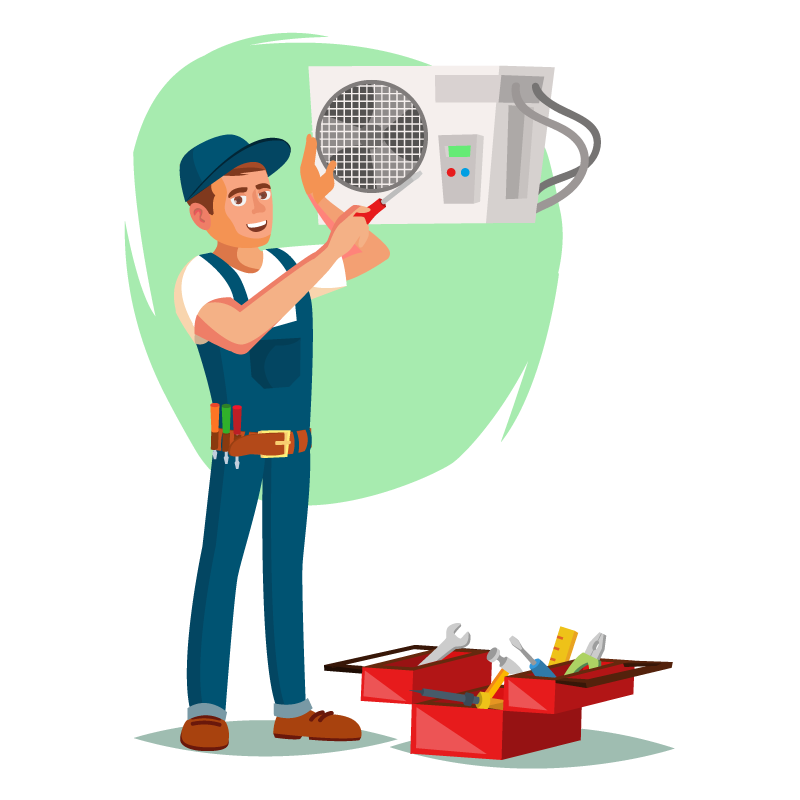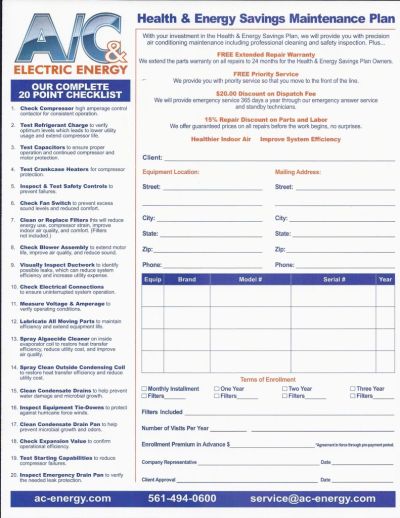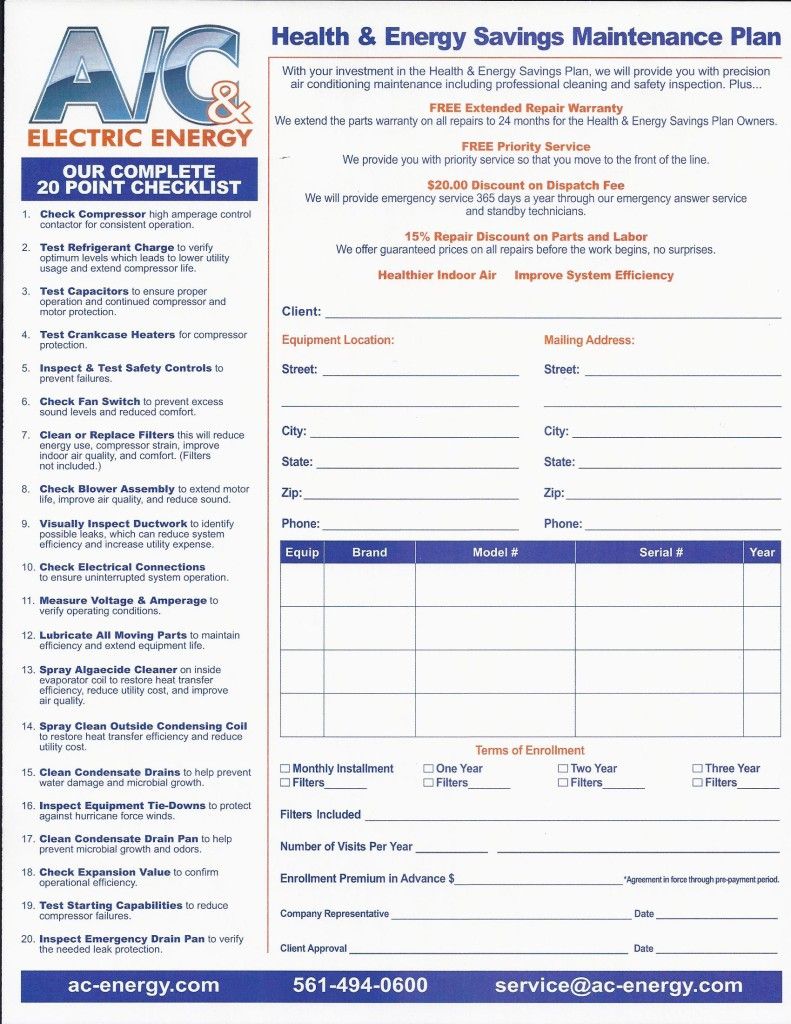HVAC Services in Palm Beach Gardens
AC & Electric Energy Has Been South Florida's Premiere Air Conditioning Repair Team Since 1984.

Do I Need Regular A/C
Maintenance?


What is the recommended schedule for servicing an HVAC system in Palm Beach Gardens?
If your air conditioning system both heats and cools your home, you should have maintenance performed in the Spring and Fall. Many dealers provide priority service for their customers who have an annual maintenance or service agreement. Bi-annual preventative A/C maintenance on your Palm Beach Garden property will ensure that your system runs as efficiently as possible.
Frequently Asked Questions
INSTALL MORE PLANTS. Installing more leafy plants and trees around your home helps reduce the amount of sun shining on your roof, windows, and outdoor air conditioning unit.
COVER YOUR WINDOWS. Close your window blinds or curtains also install outdoor awnings, solar screens, or window film on the outside of windows.
ADJUST THE TEMPERATURES. If you move your thermostat to a comfortable level you can save as much as 10 % on your electric bill. Another solution is a programmable thermostat for programming the times that you need colder air or not.
USE CLEAN AIR FILTERS. Dirty air filters restrict air flow and cause the system to become inefficient, use more electricity, and cost you more money.
UPGRADE YOUR SYSTEM. If you need a major repair on an older air conditioning system, consider replacing it with a new energy-efficient unit. Rule of thumb is seasonal energy efficiency ratio of 16 or higher qualifies for rebates.
SEAL LEAKS. Schedule an ACT test for your home to find and fix those leaks in your home
SIGN UP FOR ENERGY PROGRAMS. The power company installs a small switch on equipment that you enroll in the program, like your water heater, pool pump, or central air conditioner.
With average highs in the 90’s through the hottest summer months, homeowners in Palm Beach Gardens will save a lot of money in AC repairs by purchasing a central air conditioner with a Seasonal Energy Efficiency Ratio (SEER) of 16 or higher.
In general, the best way to save money for years to come on your utility bills is to buy an air conditioner with the highest SEER you can afford. The savings from each additional SEER is well worth the added upfront cost. Another way to save money is to take into consideration the overall efficiency of your home and your system’s ductwork.
Whenever you plan to upgrade your HVAC system, it’s a good idea to have your home analyzed for its efficiency. This will identify any areas in the ductwork that need to be air sealed to ensure that the air moves more efficiently from your air conditioner to the rooms in your home. An infiltration test can determine how well your duct works as well as doors and windows are sealed. Reducing outside and attic infiltration will increase your home’s efficiency.
By maximizing your home and ductwork efficiency, you’ll not only save money because your system won’t have to work as hard, but you may be able to purchase a smaller system that will cost less and be a better fit for your home.
SEER rating are the method used to describe the efficiency of a particular equipment system.
SEER stands for “Seasonal Energy Efficiency Ratio”. The systems purchased today typically range from 13.00 SEER to 20+ SEER. If you have a home and the current system is 10-15 years old, you may have a system that ranges from 6.0 SEER to 10.00 SEER. Of course at the time it was installed, 10.00 SEER was considered “High Efficiency”. Today, with all the focus on conservation and energy savings, that “High Efficiency 10.00 SEER” from 10-15 years ago is growing obsolete. In the United States, SEER is computed by measuring cooling in British thermal unit (BTU) and energy consumed in watt-hours, so the resulting number is measured in units of 0.29307107. Thus, a US SEER of 14 BTU/W·h corresponds to an efficiency ratio of only 4.1.
As of January 2006, all residential air conditioners sold in the United States must have a SEER of at least 13. ENERGY STAR qualified Central Air Conditioners must have a SEER of at least 14.
Substantial energy savings can be obtained from more efficient systems. For example by upgrading from SEER 9 to SEER 13, the power consumption is reduced by 30% (equal to 1 − 9/13). It is claimed that this can result in an energy savings valued at up to US$300 per year depending on the usage rate and the cost of electricity. With existing units that are still functional and well-maintained, when the time and value of money is considered, retaining existing units rather than proactively replacing them may be the most cost effective. However, the efficiency of air conditioners can degrade significantly over time. Therefore, preventative maintenance should be performed regularly to keep their efficiencies as high as possible
PERMITS & LICENSING. Before you hire a contractor, you may want to investigate your area’s permit and licensing requirements. Call the city and ask what the requirements are for your installation, including permits. If a contractor tells you it doesn’t matter, cut ties immediately. Work performed without permits could land a hefty fine in your lap, or additional costs for disposal of old materials.
INSURANCE. Don’t skip this one: Never hire uninsured air conditioning contractors, no matter how low the estimate. This is a recipe for disaster that includes blowing up your bank account should anything ever go wrong with the installation. Ask for hard copies of current general liability and worker’s compensation insurance. If something goes wrong, including injuries, the responsibility can fall on the homeowner if the person they hire is uninsured.
REFERENCES. Most air conditioning contractors keep records of clients and, as a marketing strategy, ask whether future customers may contact them for references. Ask them for contact information of at least ten former clients. Calling all ten is excessive, but having at least ten contacts who can speak on the contractor’s behalf shows a large pool of happy customers. Randomly pick a few to call. You may also consider checking for complaints filed against the contractor with the Better Business Bureau. Even great ones get complaints from time to time, but most attempt to resolve the issue immediately. You can check on-line or by calling the Better Business Bureau.
CONTRACT. You’ve done your homework and found a contractor who seems like a good fit. Make sure their HVAC service plan for your home in Palm Beach Gardens is outlined with everything specifically outlined and priced in the proposal. This should include disposal and permit costs, as well as estimated dates for starting and finishing the project. You don’t want to be hit with hidden costs.
PAYMENT. Most air conditioning contractors expect a deposit before starting work. Generally, you should avoid installers who want everything paid up front. This deposit should be included, and noted as paid, on a pricing schedule that’s easy to understand.
OUTDOOR UNITS
- Inspect unit for proper refrigerant level and adjust if necessary
- Clean dirt, leaves and debris from inside cabinet
- Inspect base pan for restricted drain openings—remove obstructions as necessary
- Inspect coil and cabinet—clean as needed
- Inspect fan motor and fan blades for wear and damage—on older models lubricate as needed
- Inspect control box, associated controls/accessories, wiring and connections. Controls may include contactors, relays, circuit boards, capacitors, sump heat and other accessories. All control box and electrical parts should be checked for wear or damage.
- Inspect compressor and associated tubing for damage
INDOOR UNITS
- Inspect and clean blower assembly (includes blower housing, blower wheel and motor)
- On older models, lubricate motor and inspect and replace fan belt if needed
- Check combustion blower housing for lint and debris and clean as necessary
- Inspect evaporator coil, drain pan and condensate drain lines. Clean as needed
- Inspect for gas leaks in gas furnaces
- Inspect burner assembly—clean and adjust as needed
- Inspect ignition system and safety controls—clean and adjust as needed
Inspect heat exchanger or heating elements - Inspect flue system—check for proper attachment to the furnace, any dislocated sections, and for signs of corrosion. Replace if necessary.
- Inspect control boxes, associated controls, wiring and connections
- Clean or replace air filters
- Inspect conditioned airflow system (ductwork)—check for leaks
WHILE YOUR SYSTEM IS OPERATING
- Monitor system starting characteristics and capabilities
- Listen for abnormal noise
- Search for source of unusual odors
- Monitor air conditioning and heat pump systems for correct refrigerant charge
- Measure outdoor dry bulb temperature
- Measure indoor dry and wet bulb temperature
- Measure high and low side system pressures
- Monitor gas furnace for correct line and manifold gas pressure—make adjustments as needed
- Measure temperature rise and adjust airflow as needed
- Check vent system for proper operation
- Monitor system for correct line and load volts/amps
- Monitor system operation per manufacturer’s specifications
- Provide system operation report and recommend repairs or replacement as necessary


